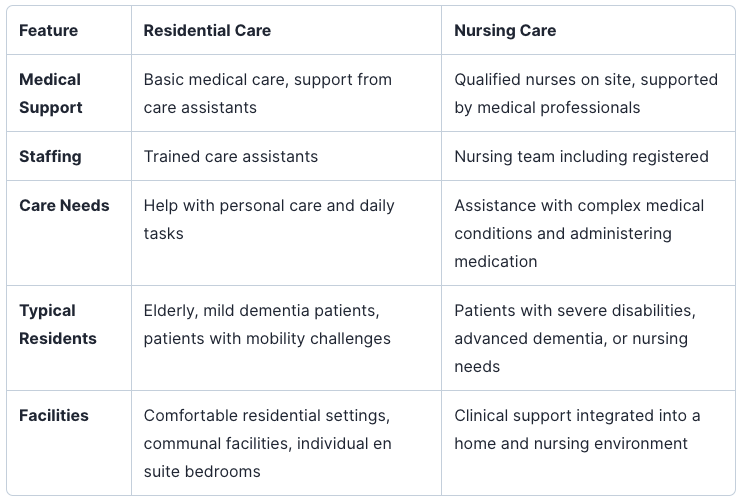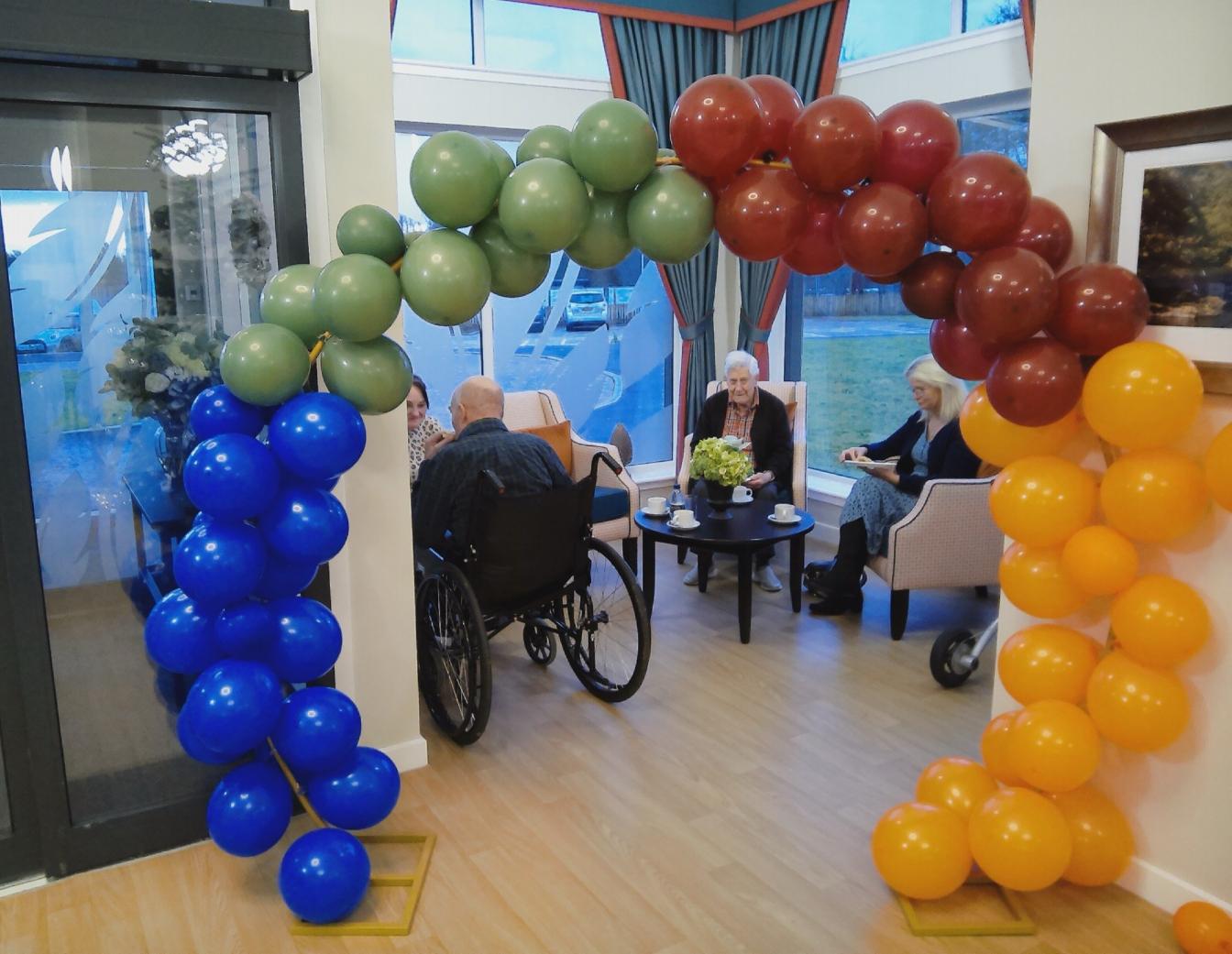What is the Difference Between Residential Care and Nursing Care?

When considering long-term care for yourself or a loved one, it's crucial to understand the difference between residential care and nursing care. While both types of care provide safe, supportive environments for individuals who can no longer live independently, the level of medical support and assistance with daily tasks varies significantly. At Osprey Court Care Home, we offer both residential and nursing care options tailored to individual needs, helping residents maintain quality of life with dignity and compassion.
We will explore the key differences between residential care and nursing care, who each type of care benefits, and what families can expect in terms of support, environment, and costs.
What is Residential Care?
Residential care refers to a setting where individuals live in a care home and receive help with everyday living. This includes personal care such as washing, dressing, eating, taking medication, and moving around safely. The aim is to support residents who are mostly stable medically but need assistance with daily tasks.
Who is Residential Care For?
Residential care is ideal for individuals who:
- Are no longer able to live safely in their own homes
- Require help with personal hygiene, meals, and mobility
- Have mild to moderate dementia
- Benefit from social and physical activity in a structured, secure setting
- May feel isolated at home and need companionship
Those in residential care homes typically do not require frequent medical treatment or supervision by a qualified nurse, but they do need care assistants to support them with daily life.
What is Nursing Care?
Nursing care, often provided in a nursing home, includes all the assistance offered in residential care, along with specialist medical care delivered by qualified nurses. This is essential for residents with complex medical condition, ongoing ill health, or who require frequent medical attention.
Who is Nursing Care For?
Nursing care is best suited for individuals who:
- Have severe physical disabilities
- Suffer from advanced dementia or mental health issues
- Require specialist knowledge to manage complex medical needs
- Need intravenous medication, wound care, or tube feeding
- Have severe learning disabilities or mental illness
In these settings, registered nurses are available 24/7, supported by qualified care assistants and visiting health professionals, such as a district nurse or GP. This ensures every resident receives the nursing care component they need to manage their condition effectively.

The Core Differences: Residential Care and Nursing Care
Understanding the distinctions between residential care and nursing care helps families make informed decisions. Here's a closer look at how they differ:

Assessing the Right Level of Care
Before choosing a care home, it's essential to undergo a needs assessment, typically conducted by your local authority. This assessment identifies the level of care required and helps determine whether residential care or nursing care is more appropriate. Following the needs assessment, a financial assessment may be carried out to determine. who pays for the care. While residential care and nursing care can be self-funded, those with limited assets may be eligible for local council support.
For residents needing nursing care, the NHS may contribute through NHS-funded nursing care. This support covers the cost of the nursing care component, although it does not cover accommodation or basic care services.
Residential Homes vs Nursing Homes
The difference between a residential care home and a nursing home is more than medical care. It's about environment, support levels, and future planning.
- Residential care homes offer a home-from-home feel with a focus on maintaining independence and enabling residents to enjoy social and physical activity.
- Nursing homes offer all the above, with the added benefit of round-the-clock qualified nurses on site to provide medical care and support residents with complex medical or physical disabilities
At Osprey Court Care Home, both residential and nursing care residents enjoy access to communal facilities, personalised care plans, and opportunities to engage with other residents, creating a vibrant, supportive community.
Can the Level of Care Change Over Time?
Yes. Many residents begin with residential care and later transition to nursing care as their health needs increase. This is common for those with progressive conditions such as dementia, Parkinson's disease, or those recovering from strokes or surgeries. Our care and support services are designed to be flexible, so residents can stay in familiar surroundings even as their needs evolve.

The Role of Qualified Care Assistants and Nurses
At Osprey Court Care Home, we pride ourselves on having a compassionate and experienced team of qualified care assistants and registered nurses. In residential care settings, care assistants provide round-the-clock support with personal care, daily tasks, and ensuring residents are comfortable and safe. In our nursing unit, qualified nurses offer not only the same level of attentiveness but also deliver specialist medical care, including administering medication, overseeing treatment plans, and managing complex medical conditions. This collaborative approach ensures all residents receive the right type of care.
How Medical Professionals Support Residents
Our team works closely with visiting health professionals, including district nurses, GPs, physiotherapists, and mental health specialists. These experts visit residents regularly to provide essential medical care, from routine health checks to more specialist interventions. For residents with ongoing ill health, these visits are a vital part of their care plan. Our seamless coordination with the NHS ensures that residents at Osprey Court continue to receive the same level of healthcare they would have in their own homes, with the added reassurance of supportive, expert team always on hand.

The Importance of Communal Living
Life at Osprey Court is about more than just care - it's about community. Both our residential care and nursing care wings offer residents access to shared communal facilities, including lounges, gardens, and dining spaces where residents engage in activities and form friendships. These spaces promote social and physical activity, reducing loneliness and improving overall wellbeing. Whether it's a group exercise class, a games afternoon, or simply chatting over tea, these moments help residents feel connected and fulfilled.
Supporting Independence and Quality of Life
The ultimate goal of both residential care and nursing care is to help residents remain independent as long as possible while ensuring their safety, comfort, and wellbeing. We believe that every resident deserves:
- A say in their daily routine
- Access to own space and privacy
- Engaging activities that promote cognitive and physical health
- Tailored care services that evolve as needs change
Whether a resident needs help getting out of bed safely, taking medication, or participating in a group exercise class, our team is here to provide support every step of the way.
Helping Residents Remain Independent
Our philosophy is to support each person to remain independent for as long as possible. In both residential and nursing care settings, this might involve assistance with mobility aids, supporting residents to get out of bed safely, or helping them maintain hobbies and routines. For those with milder conditions, promoting independence can boost confidence and reduce the risk of further decline. Our staff are trained to strike the right balance between offering more support and encouraging self-reliance where appropriate.
Personalising Care and Support Plans
Every resident at Osprey Court receives a tailored care plan based on their individual needs, preferences, and medical history. Our goal is to provide support in a way that enhances independence while meeting personal and medical needs. Whether someone is recovering from a hospital stay or dealing with a complex medical condition, our plans evolve as their health changes. This adaptability ensures residents feel empowered and involved in their own care journey, regardless of whether they're in a residential care home or receiving nursing care.

Transitioning Between Care Levels Smoothly
As health needs evolve, we ensure a smooth transition between both residential care and nursing care within the same home. For example, a resident living in a residential setting who begins to require frequent medical treatment can move to the nursing unit without the upheaval of leaving familiar surrounding or care teams. This continuity is a major advantage of a care home like Osprey Court, which offers multiple care types under one roof. It helps preserve stability and trust, which is particularly important for older adults and those with cognitive conditions.
So, what is the difference between residential care and nursing care? In short:
- Residential care offers assistance with daily tasks, personal hygiene, and social engagement for those who do not require specialist medical care.
- Nursing care is designed for individuals with medical conditions, physical disabilities, or mental health issues that demand oversight by registered nurses.
Choosing between the two depends on a comprehensive needs assessment and understanding the level of medical care required.
At Osprey Court Care Home, we understand that this decision can feel overwhelming. That's why our team is here to answer questions, guide you through assessments, and ensure you or your loved one finds the right balance of support, safety, and independence.
Discover the Right Care for Your Loved One Today
Take the first step towards peace of mind, contact us to arrange a private tour or speak directly with our expert care team to learn how we can support your family’s unique needs.






